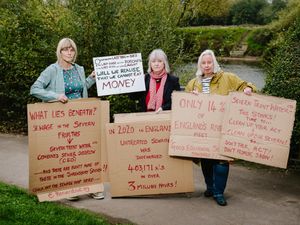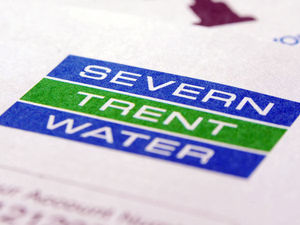‘Nothing being done’ say residents angered over sewage flowing into river
Residents are kicking up a stink about sewage being allowed to flow into the river at Shrewsbury.

The ancient county town relies on combined sewer overflows (CSOs) which mix rainwater with everything that townsfolk flush down the loo and let drain down the sink.
When it rains heavily the system is overwhelmed and overflows – straight into the River Severn.
“Nothing is being done about it and it is getting worse,” said resident Claire Kirby, of Coton Crescent. She is among residents who have organised a protest meeting in Coton Hill on Thursday.
“When we have intense rainfall the manhole covers in Pig Trough path pop up and all the effluent spreads across the footpath. We report incidents but it never gets cleaned up.”
She called on Severn Trent Water to do more to stop the problem, adding that in her opinion privatisation of the water industry has made the situation much worse.
“We need massive investment in the sewer systems,” she added.
Much of the residents’ anger focuses on what happens at the Pig Trough path, which is used to get from Coton Hill down to the West Mids Showground, and was well used by members of the public to get to and from the recent folk festival.
She said that Thursday’s meeting, from 7pm to 9pm at Friends Meeting House, in Corporation Lane, will give people the opportunity to give their point of view and to see what further action they want to see.
The keynote speaker at that meeting will be Pete Lambert of the Shropshire Wildlife Trust. He is also concerned about the environmental impact of mixing rainwater with everything including non-biodegradable wipes, agricultural chemicals, sanitary products, and cleaning chemicals.
“Shrewsbury is an old town with old infrastructure,” said Mr Lambert, who is the trust’s land and water team manager. “The trouble is it all comes back to us because water from the river is extracted at various points and has to be cleaned up before we drink it. Cleaning the water of things like microplastics is getting more and more expensive and costs us a lot of money in our bills.”
Mr Lambert’s talk at the residents’ meeting will put the focus on raising awareness of the issue, and saying what individuals can do to ease the problem.
Mr Lambert says climate change is making flooding events more likely in both summer, when water runs off hard ground, and in winter when the ground becomes saturated and unable to soak up excess rainfall.
He also says urban development are making flooding more likely when building is allowed on the flood plain.
A spokesperson for Severn Trent Water said the company is “consistently recognised as a leading performer in the sector for our environmental credentials, having recently achieved the Environment Agency’s highest four star rating.”
The spokesperson says the company has an “absolute commitment to the environment and to improving river quality in our region.
“To do that, we’ve already invested £355 million on overflow improvements and minimising our impact on rivers. Earlier this year we were given the green light by Ofwat (water industry regulator) for our Green Recovery plans, that will see us invest £566m in projects which benefit communities and the environment, including our rivers.”
The spokesperson added that while Severn Trent doesn’t own rivers it “absolutely want to go further and play a leading role in improving river quality in our region.
“Many sectors and activities impact on the quality of our rivers so whilst we continue to minimise the impact of storm overflows, we commit to continue to work with others, such as the agricultural sector as well as educating customers to prevent wipes and sanitary products from reaching rivers.”





